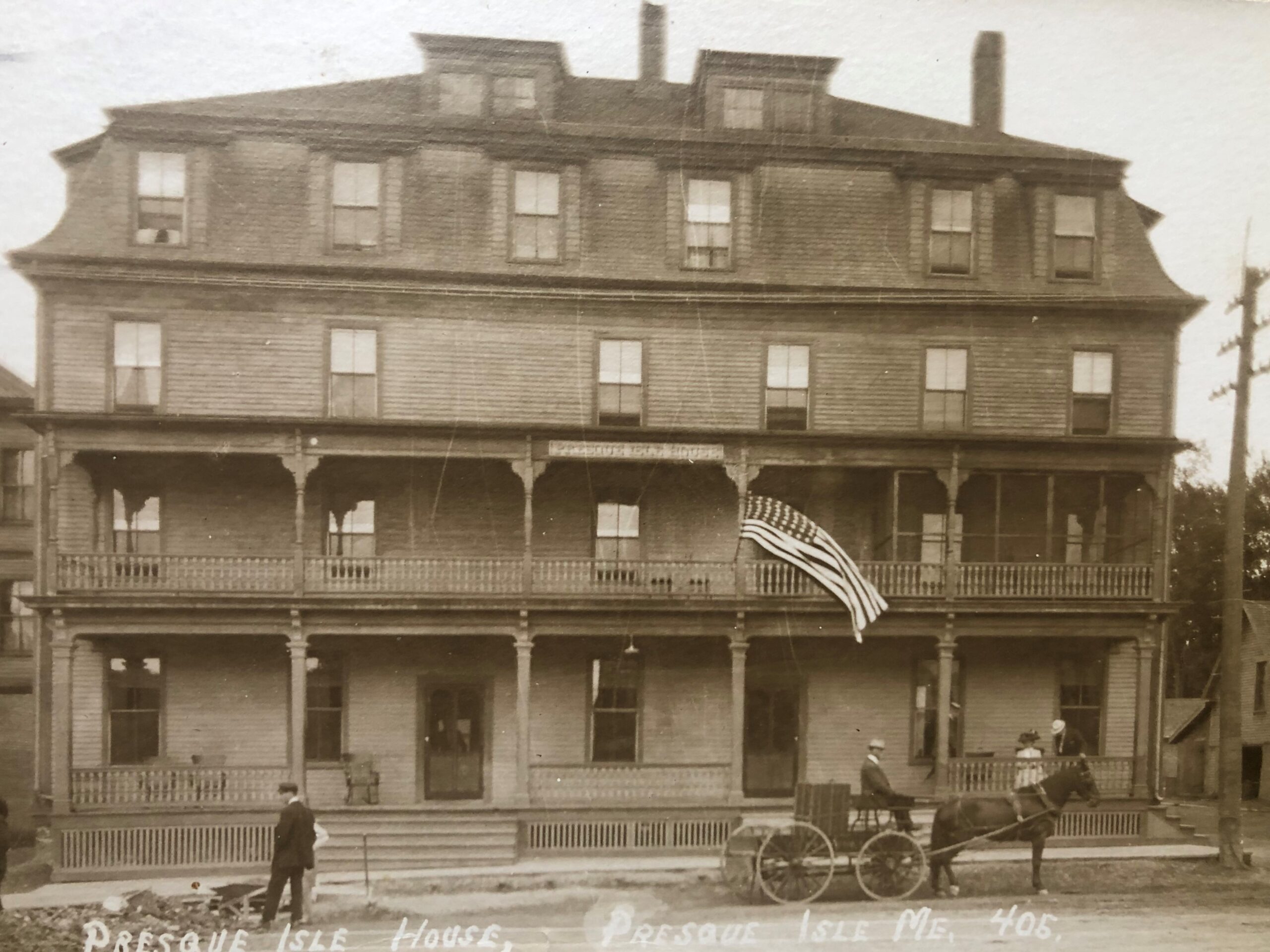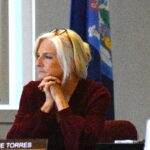
PRESQUE ISLE, Maine — What do a coffee shop, a ballroom and a racehorse have in common? In Presque Isle, the answer is simple: the iconic Northeastland Hotel on Main Street.
The hotel has stood downtown for nearly 90 years. Generations of residents and visitors have gathered at its Coffee Shop, most recently known as the Sidewalk Cafe. The hotel’s Red Room, a large ballroom and dining area once called the Cafe Rouge, has seen countless wedding receptions, class reunions, meetings — and even the 2004 moose lottery.
The building has now been acquired from the Hedrich family by the nonprofit development corporation IgnitePI, and is poised to begin its next life — as part of the city’s 30-year plan to revitalize the downtown. IgnitePI will continue operating the hotel, add dining options and offer a co-work space, while preserving the building’s historical character.
Clint Deschene, IgnitePI’s director of community innovation, grew up in Presque Isle and knows the Northeastland well.
“This was the place for making all the memories. More than anything it was breakfast [at the Coffee Shop] with my dad and even my brother on quite a few occasions,” Deschene said.
Historical icon
Since its 1932 opening, the hotel has been a center of local activity. But before the Northeastland, the Presque Isle House occupied the site. This is where the horse comes in, in a story that has become local legend.

Famous Presque Isle-based racehorse John R Braden is pictured in this 1921 photo with his driver John Willard. John R Braden became one of the most unstoppable racehorses in Maine and Maritime Canada in the 1920s. The Braden Theater, which first opened in 1950, was named after him. (Courtesy: Presque Isle Historical Society)
John R. Braden, Presque Isle’s famous harness racing horse of the 1920s, sped to both mile and half-mile records. Purchased by the local Mooseleuk Club and driven by John Willard, the horse put the city on the map in the racing world.
The Bangor Daily News recounted a locally famous banquet, held at the Presque Isle House on Oct. 14, 1921, to celebrate John R.’s success, during which the horse was led indoors to the festivities. As guests enjoyed a celebratory meal, Braden was served oats in a silver bowl.
“For years people have talked about the fact that they had banquets in his honor, and they talk about bringing him into the hotel to have champagne from his trophy cup,” said Kimberly Smith of the Presque Isle Historical Society.
Many locals swear they’ve seen a picture of the horse at the banquet, but an actual photo has so far not surfaced.
“No one has it,” Dick Graves, local optometrist, historian and author, said.
“I’ve been looking for it for years,” hotel General Manager Robin Doody said.
Graves said the Presque Isle House was rebuilt several times following fires, including a massive blaze in 1900. The building was deemed a fire hazard and demolished in 1931, and ideas for the city’s newest hotel took shape.
Well known Presque Isle contractor and sawmill owner N.W. Downing, the area’s premier builder at that time, built the Northeastland at a cost of $200,000, Smith said.
In its June 13, 1932, edition, the BDN announced that the grand opening of Presque Isle Hotels Inc.’s “magnificent new Northeastland Hotel” was to be held the following evening, June 14. The new building boasted “a restful lobby” and an electric kitchen among other amenities.
“Observers prophesy that it will figure prominently in local social functions,” the article said.

The Northeastland Hotel in Presque Isle appears in this 1937 photo, featuring Vincent Barresi’s barbershop and, at right, the J.W. Tapley Jewelery store, which in 1950 became the Coffee Shop. (Courtesy of Dick Graves)

The lobby of the Northeastland Hotel, facing Presque Isle’s Main Street, as it appeared in the 1930s. (Courtesy of Dick Graves)
Social giant
With its meeting and dining facilities, the Northeastland showcased Presque Isle’s social life.
Its first business rental was to Vincent Barresi, who set up his barbershop there, Graves recounted. Barresi purchased barber chairs, which still exist, serving Dwight’s Barber Shop just down Main Street.
“It was really the center of everything that took place within our community,” said the historical society’s Smith. “Of course, it was the home of the Rotary Auction for years and years, and there were a lot of functions held there during World War II.”
Both the Presque Isle Army Airfield, as it was known in the 1940s, and later the Presque Isle Air Base, brought a lot of people to the Star City. Military personnel were housed there and many festivities took place at the hotel.
“It was the center of our social life, especially after the opera houses went away,” Smith said, adding that at one time Presque Isle had 12 different opera houses. “That’s where you had graduations and weddings, anything that needed a large venue.”
Bridge games, club meetings, socials and business functions — many found their way into the BDN’s social news: “Twenty Van Buren Sacred Heart High School girls, chaperoned by Mrs. Clifford Plourde and Miss Henrietta Dionne, attended the 16-week Dale Carnegie course …” (March 1, 1949). “More than 100 women were present when the Pierian Club held its annual music day tea Monday at the Northeastland Hotel” (Jan. 21, 1953). “The local National Farmers Organization held its election of officers for the coming year at the Northeastland Hotel here …” (Jan. 20, 1969).

Among the vintage treasures the Northeastland Hotel has in its lobby display cases is this Christmas 1936 menu, where for all of $1.25 one could have a full-course meal with various appetizers, entrees including “roast stuffed green goose,” salads, dessert including English plum pudding, and fruit and cheese. (Paula Brewer | The Star-Herald)

This photo of Dan Ladner (at the piano) and friends providing music circa 1950-60, placed next to a vintage coffeepot, is featured in a display in the Northeastland Hotel lobby. (Paula Brewer | The Star-Herald)
Graves recalled his father parking cars for the Northeastland. “I grew up on Second Street, right across the street. They hired him to park cars, and he used to tie me [on a sled] behind his car and slide me around the parking lot,” Graves laughed. “They’d arrest somebody for that today.”
Smith said the hotel still unites the community.
“It has a huge impact for a number of reasons. First of all, it’s a hotel in the middle of our downtown, and you just don’t see that anymore,” she said.
She recalled one guest she had met there.
“It was the middle of winter, 20 below zero. This woman said, ‘This is such a beautiful Main Street,” and she went outside and walked around to take pictures — at 20 below,” Smith said.
Doody, the general manager, pointed out one of the hotel’s most memorable features: the group of businessmen who have met at the Coffee Shop every morning since the 1950s. Many of those who remain are now in their late 70s or early 90s. Doody has her own connection with the cafe: her grandmother, Bertha Mahaney, was among the Coffee Shop’s beloved staff for many years.
Facelifts and the future
The Northeastland underwent several renovations, adding the Coffee Shop in 1950. In 1954 a 30-room addition opened, completed by original builder N.W. Downing. The addition was unveiled in an open house in early March 1955, according to the BDN.
A number of local stockholders owned and operated the hotel until the 1970s, Doody said, when Frank “Skippy” Carroll, owner of Carroll’s Auto Sales, bought the majority of shares and operated it himself.
In 1986, Joe Hedrich Sr., owner of Hedrich Vending and other local enterprises, bought controlling interest, bringing another major facelift. Joe Sr. and sons Joe Jr. and Greg renovated the interior completely, including all guest rooms, and updated plumbing and wiring, Doody said.
As the Northeastland’s newest phase takes shape, Deschesne said IgnitePI will run the hotel with its current staff and add new food and beverage options. Also in the works are plans to preserve artifacts and vintage images to keep the hotel’s history alive.
“It is the icon of the downtown,” he said. “That’s what IgnitePI is all about. We want to preserve our history — remembering what we were, and honoring the traditions as we move forward.”
Kim Smith said she has no doubt the Northeastland will maintain its community stature.
“Having that type of amenity right smack dab in the middle of our downtown is so unique today, and it’s a perfect step-off to really showcase our downtown,” Smith said. “And we do really have a pretty downtown.”








